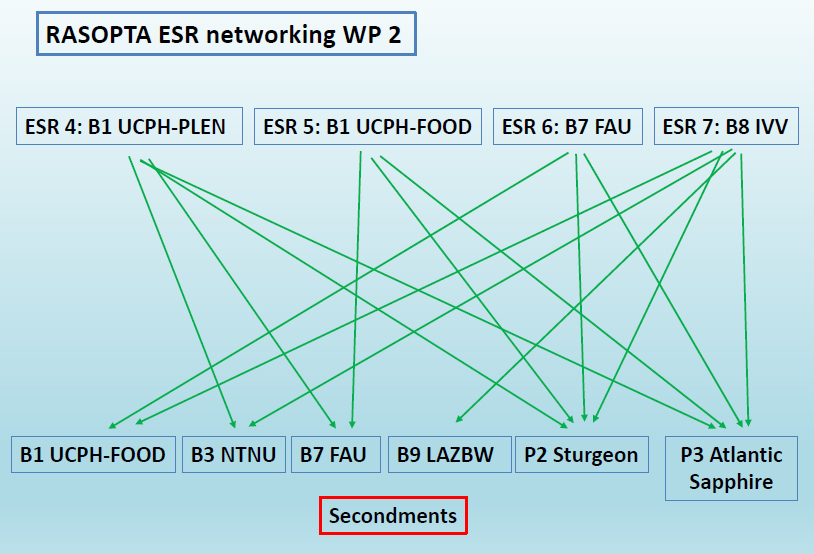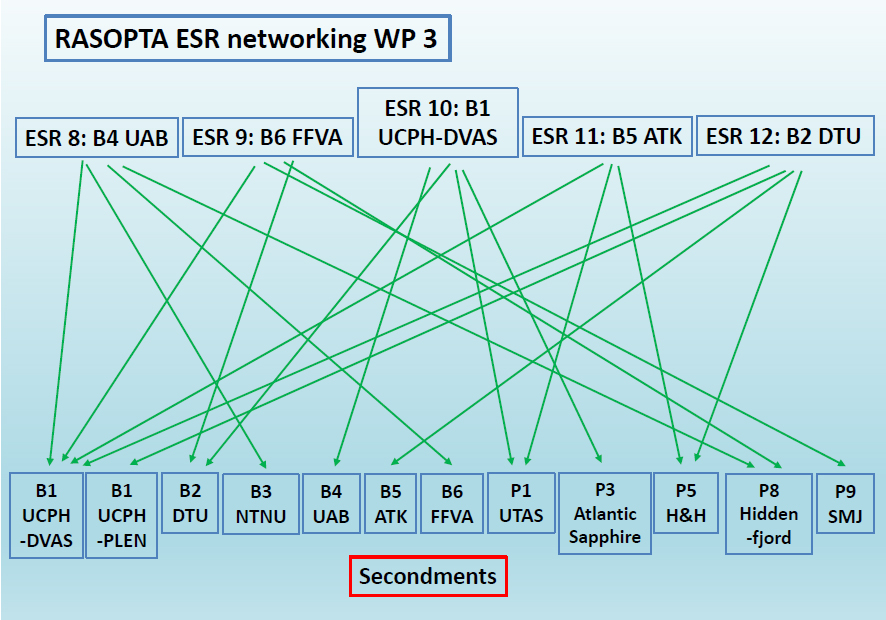ESR projects
The training goal of the RASOPTA training is to educate 12 ESRs in state-of-the-art technologies in RAS production to create a new generation of highly skilled young researchers within aquaculture disciplines. The research training is conducted in 3 tightly-connected work-packages (WPs) that combine academic expertise with hands-on experiences from the RAS industry within production of important aquaculture species on the European market: salmon, rainbow trout, pike-perch and sturgeon (for caviar production). See the list of the planned ESR projects below.
ESR1: Determine potential beneficial or harmful effects of the biofilter on microbial water quality and examine nutrient cycling.
Recruitment and enrolment: Department of Biotechnology and Food Science, NTNU , Trondheim, Norway
Contact: Professor Ingrid Bakke, ingrid.bakke@ntnu.no
ESR2: Clarify the implications of particles on microbial activity and water quality, with particular focus on O2 consumption.
Recruitment and enrolment: Agricultural Center Baden-Württemberg, Germany
Contact: Dr. Alexander Brinker, alexander.brinker@lazbw.bwl.de
Particles remain a main issue for fish production in RAS. Aside from direct effects, the particulate matter can have several indirect effects at various levels of the system with potentially harmful consequences for fish stock and thus fish welfare and profitability. However, the dynamics of particle load in RAS and the specific implications on other water parameters are still poorly understood.
The main focus of the candidate’s research work will lie on the characterization of particles in commercial RAS considering size distribution, shape parameters and density.
ESR3: Examine interactions between microbes in water (planktonic and particle-associated) and fish by microbiome analyses.
Recruitment and enrolment: Department of Biotechnology and Food Science, NTNU , Trondheim, Norway
Contact: Professor Olav Vadstein, olav.vadstein@ntnu.no
ESR4: Use the common off-flavour compound geosmin as proxy to identify microbial hotspots for off-flavour production and isolate new, geosmin- degrading bacteria for inoculation in RAS biofilters.
Recruitment and enrolment: Department of Plant and Environmental Sciences (PLEN) University of Copenhagen, Denmark
The PhD student will be to identify microorganisms that produce off-flavours in RAS and characterize their biology and ecology. Focus will be on bacteria that produce the off-flavour compound geosmin (produced by selected bacteria in RAS). The experimental procedures will include a wide range of disciplines, ranging from classical cultivation methods to molecular and bioinformatic analyses of genes involved in the geosmin synthesis.
Contact: Professor Mette Haubjerg Nicolaisen, meni@plen.ku.dk
ESR5: Apply analytical techniques to identify varieties and concentrations of off-flavours in freshwater and marine RAS, including also adverse bromine compounds in marine RAS.
Recruitment and enrolment: Department of FOOD, University of Copenhagen, Denmark
Contact: Professor Mikael Agerlin Petersen, map@food.ku.dk
ESR6: Investigation and the development of managing strategies regarding off-flavours in fish and water of RAS
Recruitment and enrolment: Friedrich-Alexander -Universität Erlangen Nürnberg, Germany
Together with three other Early Stage Researchers (to be recruited by the University of Copenhagen and the Fraunhofer IVV (Freising, Germany), you will contribute to RASOPTA’s work package 2 which focuses on the investigation and the development of managing strategies regarding off-flavours in fish and water of RAS.
You will identify off-flavour hotspots in freshwater RAS systems, develop strategies to avoid off-flavour formation, and evaluate consumer acceptance of RAS fish. You will apply analytical methods such as gas chromatography-olfactometry/mass spectrometry to investigate water samples obtained from different sites of the RAS, and determine the influence of biofilters and microbes on off-flavour formation. Moreover, you will study the organoleptic properties of the fish and its acceptance by sensory evaluation and consumer testing of fish. You will work in close collaboration with the Early Stage Researchers at the University of Copenhagen and at Fraunhofer IVV, who will work on additional aspects of off-flavour generation in different RAS systems.
Contact: Professor Andrea Buettner, andrea.buettner@fau.de
ESR7: Resolving the influence of different fish feeds on off-flavours in RAS water and develop new experimental feeds with alternative protein and lipid sources.
Recruitment and enrolment: Fraunhofer Institute for Process Engineering and Packaging IVV, Freising, Germany
You will contribute to RASOPTA’s work package 2, which focuses on the investigation and the development of managing strategies regarding off-flavours in fish and water of RAS. Specifically, the project will focus on the impact of feed ingredients on the off-flavour in fish flesh. You will explore the direct and indirect relationship between fish feed and off-flavour levels in RS water and fish by sensory characterization and analysis of different feeds and resolve the influence of different feeds on fish health, microbial growth and activity in relation to water quality. You will work in close collaboration with the ESRs in Copenhagen and Erlangen, who will work on additional aspects of off-flavour generation in different RAS systems. Mobility within RASOPTA is of high importance and you are therefore expected to spend two months at University of Copenhagen, and two months at RAS production units in Denmark and France.
Contract: Dr Jonathan Beauchamp, jonathan.beauchamp@ivv.fraunhofer.de
ESR8: Examination of fish health and welfare indicators by omics and imaging technologies to pinpoint stress and immune-compromising parameters.
Recruitment and enrolment: University of Barcelona, Spain
Contact: Professor Lluis Tort, lluis.tort@uab.cat
ESR9: To identify major pathogen entry points in salmon RAS by molecular screening of air and water intake and of fish to examine vital biosecurity issues in the intensive RAS production.
Recruitment and enrolment: The Faroese Food and Veterinary Authority, Faroe Islands
To contribute to the implementation of RASOPTA´s work package three which focuses on controlling the abundance of pathogens in RAS. The
candidate will identify major pathogen entry points in salmon RAS by molecular screening of air, water and biological material. NGS methods will be developed to identify transmission pathways and evaluate the risk of introduced pathogens evolving from low to highly pathogenic strains. By conducting
longitudinal studies and screening archived material at FFVA the candidate will evaluate existing approaches for controlling pathogens and, ultimately, contribute knowledge to optimized biosecurity protocols for salmon RAS production.
Contact: Professor Debes Christiansen, debesc@hfs.fo
ESR10: To determine thresholds for infection by disease-causing bacteria by identifying pathogen infection under non-stressful and stressful conditions.
Recruitment and enrolment: University of Copenhagen, Denmark
You will contribute to a focus area on fish health in work package 3 of the RASOPTA project with 4 other ESRs who are located in Spain (Universitat Autònoma de Barcelona, UAB), Faroe Islands (Faroese Food & Vet. Authority, FFVA), Hungary (Agrártudományi Kutatóközpont “Agricultural Research Center”, ATK) and Denmark (Technical University of Denmark, DTU).
Contact: Professor Louise von Gersdorff Jørgensen, lvgj@sund.ku.dk
ESR11: will examine presence and diversity of a typically overlooked group of common RAS pathogens, namely eukaryotic parasites, such as amoebae, in different freshwater RAS.
Recruitment and enrolment: Allatorvostudomanyi Kutatointézet, Hungary
You will be involved in the design and conduct of experiments aimed at controlling parasitic infections in fish in RAS by using environmentally friendly methods (mechanical, electric, ultrasonic, thermic, biological water treatment, tank design).
Contact: Professor Szekely Csaba, szekely.csaba@vmri.hu
Fish Pathology and Parasitology
ESR12 will design and validate a novel DNA chip for diagnosis and early warning for fish pathogens, microbial water quality hazards and emergence of off-flavour producing microorganisms in RAS.
Recruitment and enrolment: Technical University of Denmark, DTU, Denmark
- Development of a rapid and cost effective diagnostic high-throughput real-time PCR (Fluidigm) system for monitoring the presence or absence of important microorganisms influencing fish health and production in RAS
- Extract DNA from the RAS system from water samples (environmental DNA or eDNA)
- Design and optimize quantitative PCR assays targeting biofilter- and water microorganisms, pathogenic bacteria, virus and parasites as well as geosmin-producing microorganism
- Include and design assays against pathogens identified by ESR 11 in biological material, water and air
Contact: Professor Peter M. H. Heegaard, pmhh@dtu.dk



